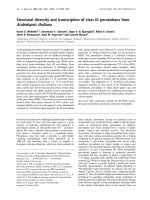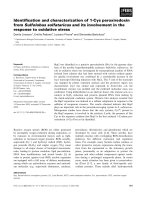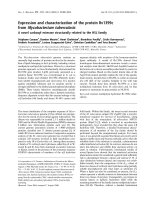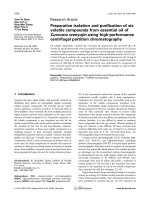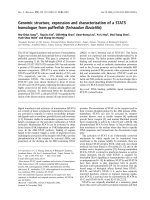Essay_Advantages and disadvantages of living far away from home
Bạn đang xem bản rút gọn của tài liệu. Xem và tải ngay bản đầy đủ của tài liệu tại đây (37.82 KB, 2 trang )
Nowadays, most students study at university after graduating from high school. Due to
the distance between their hometowns and colleges, a few students live with their
family while many others live far away from home. These two types of living have some
different influences on students in terms of living condition, financial problems and
independence.
Firstly, students living at home can enjoy better living condition than ones living
far from home. As home is the whole family’s place, it is normally large and wellequipped with many electric devices. Also, students are provided with fresh, nutritious
food. On the contrary, dormitory or rent house are usually small with poor facilities. For
example, many students living in cramped rent house have to use one small space for
cooking, eating, learning and sleeping. Owing to busy learning, students may skip their
meal or eat fast food, which badly influences on their health.
Secondly, living at home differs from living far away in that it helps students avoid
financial problems. Living at home, students have the telephone bills, electricity bills
and other daily expenses paid by their parents while students living far from home have
to pay all those things on their own with a monthly amount of money. Unlike students
who receive parents’ instruction, students who do not live with their family often lack
financial managing skills. As a result, they often spend money on unnecessary items
and cope with running out of money.
Finally, the other obvious difference is that living far from home provides students
more independence than living at home. It goes without saying that parents want to
take good care of children by setting a wide range of rules for them. Consequently,
students living with family have to ask for their parents’ permission if they want to go
out or invite friends to their homes. Additionally, parents also control their time spent
on using computer and TV. In contrast, students living without parents’ control have
more privacy because they do not have to obey the strict rules. They can go out
whenever they want and freely gather with their friends. Thanks to independent life,
they can flexibly spend time on learning, surfing websites or playing games without any
complaint.
In general, though living at home and living far away from home have some
considerable differences, each type has its own advantages and disadvantages to
students. Therefore, no matter what kinds of living students choose, they can still enjoy
their wonderful life at college.
The most obvious difference between living on campus and living at home while studying is
meeting new people and sociable life. First, although living in dormitory provides students with
endless chances to meet new people, the number of friends is still few. Consequently, it has
positive effects; it gives students more time to focus on their study. On the other hand, living in
home provides students with wide social circle. Therefore, he or she will spend much time with
friends and family member in an environment which is full of noise, disturbance, and less
concentration. Second, friends usually have the same objective, which is learning, and
developing themselves, thus they push themselves to study to compete with other fellows. For
instance, many students can make a group study sessions to help each other, and it will help in
getting high grades. A research concludes that living in residence hall and cooperative houses
has a positive influence on student grade point average (GPA). Unlike dormitory, home has no
competitive floor or strong motivation that encourages you as a student to study hard. Third, the
life inside the university campus imposes the friends you will have due to the few choices.
Conversely, students who are outside the dormitory are freer in choosing their friends.
A second difference between living on campus and living in home is time management and
responsibility. In the university, students hold their time. They can use their time wisely. For
instance, they can manage their time in making projects, meeting friends, and researching in the
library, etc. In addition, students who are living in the dormitory are more responsible to decline
the distraction and object other students to go to amusements. While students who are living at
home are less responsible because they are not the only people who hold their time, but other
share their time with them. For example, a family member can connivance him or her to go
somewhere. Furthermore, living in the dormitory can lessen the hassled time to wait for the bus.
Instead of the long transportation, short walk can send you to library, laboratory, and classroom.
The third difference between dormitory life and home life is security and safety. First, in
dormitory, there is no privacy because many roommates can easily hear and observe you.
Unlike dormitory, home provides you with privacy you want.
Second, safety for students who resides on campus hall is little compared to homes. For
example, there is a student put a poison in her roommate's lemon juice because she claimed
that, the poisoned girl always used her personal things such as food, clothes and phones
without asking for permission. Hence, she was fed up with this issue. Dissimilar to dormitory,
home provides you with safe private environment.
Here are the main three differences between living at residence hall and living at home while
studying. As we can see, it comes down to personal choice based on the financial case.
Therefore, it is important to choose the best for you to help you to approach your dreams and
success in life.

